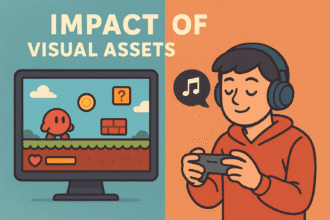Technology we take for granted when it comes to gaming
Technology is always the driving force behind gaming. As hardware becomes more capable and software improves, developers, can create higher quality, lengthier, and more encompassing games. Players, meanwhile, get to enjoy the end result.
The technology industry is thriving, yet we don’t often stop to think about the technologies behind gaming.
Least Consider Things Of How Tech has Transformed The Gaming Industry –

Here are some lesser-considered examples of how tech has transformed the industry and the experience –
Monitors and TVs
We often think about how next-generation consoles enhance gaming. With every new PlayStation or Xbox released, players are treated to immense improvements when it comes to graphics, detail, and depth.
But we don’t often think about the monitors and televisions that display these next-generation games. Back in the day, it wouldn’t have been possible. Now, monitors have high-definition displays and 4k resolution, making picture quality crystal clear.
Frame rate per second has also improved dramatically, meaning less lag and more response time between inputs and what you see on the screen.
The gaming experience has been improved dramatically by the monitors we use, which have evolved to keep up with the capabilities of console and PC hardware.
Random number generators
Now it’s time for a look at an interesting and often overlooked technology that is used a lot in gaming. Random number generators use a seed number to generate a complex sequence and randomize outcomes. This is a fundamental aspect of any digital game that is a combination of chance or skill, and there are more than you think.
The obvious place to start here is casino gaming. All slot games, in casinos and online, have what is known as a return-to-player (RTP) rating, expressed as a percentage. The RTP essentially represents the house edge. So, a 95 percent RTP means the house has a 5 percent edge.
In order to ensure the game is fair and pays out according to its stated RTP, random number generators operate in line with the programmed odds, randomizing how and when the payouts happen while keeping to the stated RTP value in the long term.
It’s not just in pure games of chance-like slots that random number generators are used. They are also responsible for rare item drops in loot crates and chests, regulate critical hits and misses in RPG games like Final Fantasy, and even determine bullet spread in some first-person shooters.
Without random number generators, online casino gaming would not be possible, and many elements of video games wouldn’t be either.
Wii Remote
This may seem like an unusual technology to throw in to the mix, but the Wii remote is actually quite astounding and revolutionary. It allows players to control the virtual character’s motions by moving their own arms and body.
The Wii remote utilizes motion sensors in order to detect movement. But that’s not all it does. Accelerometers within the remote are able to sense acceleration along three dimensions. The Wii remote plus also has a rumble feature and built-in speaker.
Optical sensor technology determines where the remote is pointing. This is possible because the remote is able to read the position of the LED lights on the Sensor Bar. The same technology can also determine distances between the bar and the remote, making forward and backward motions possible alongside other motions.
All of this adds up to a unique experience and one that brought Nintendo firmly back into a competitive position in the console market.
Cloud gaming
The final technology this article covers is the most recent to disrupt the gaming industry. Cloud gaming is now here and is providing players with a less expensive option. In this case, games run on a remote server at a cloud data center, taking much of the strain off the player’s hardware.
This means players don’t actually need a high-spec gaming PC or the latest console to enjoy triple AAA titles. They are essentially streamed to any capable internet-connected device, such as an old PC, Chromebook, TV, or mobile.
Cloud gaming services are subscription based, which again, for those who play regularly, could work out cheaper than forking out for full-priced games. Microsoft, Google, Nvidia, and Sony are among those who currently offer cloud gaming services.

















